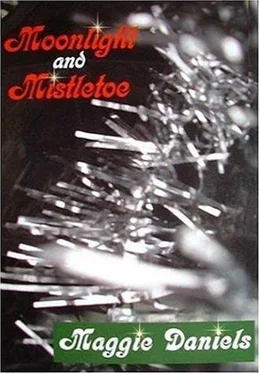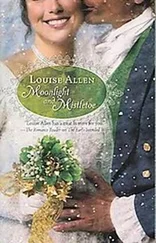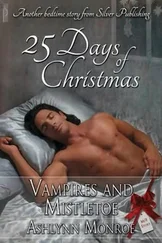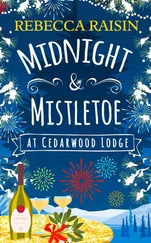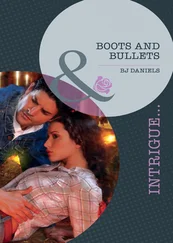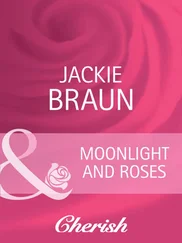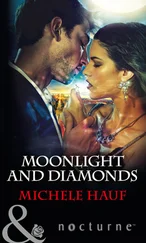Buck could see Scarlett O’Hara Scraggs was right. Alicia Grissom had dropped everything in her hurry to leave for Chicago. The rooms were strewn with Christmas ornament boxes, partly wrapped gift packages, and ropes of tree tinsel. In the parlor area the blue spruce Christmas tree that Buck had put up towered over everything, half-finished.
The two girls had their backs to him, bent over the boxes. Buck was suddenly aware that Scarlett wore a sweater with holes in it over a faded dress and was bare-legged, her feet in rubber Japanese sandals, purple with cold. The child had on a frayed magenta football jacket over either a long shirt or a very short dress, it was difficult to tell, and baggy lime-colored tights with snow-stained sneakers.
Buck winced. This was not just the signs of poverty; the southern Appalachians were full of people who had been poor for generations. This was something worse.
The child straightened up, a tree ornament in her hand. “When we get to Atlanta,” she said in a dreamy voice, “we’re going to have to work hard and make enough money to find a house like this to live in.” She lurched her way to the tree and fastened the ornament on it.
“Well, first I gotta get a job.” Scarlett’s voice was less hopeful. “I don’t know how to do much, and I missed my high school diploma.”
“Oh, you’re going to get a good job, Scarlett,” the child told her, “because you’re so smart. Even ole Devil Anse Grandpa says that. And you’ll make enough money and we’ll be able to buy a car, and go travelin’.”
Scarlett watched her sister as she dug another ornament out of the box and fixed it to the tree.
“First we got to get there,” she said softly. “We didn’t do so good today when we missed the bus because your dog was trying to kill that old woman’s cat. It hasn’t done you a bit of good, either, being out in the cold. Come here, Farrie.” She pulled the child to her and laid her hand on her forehead. “You’re turning red. I just know you’re gonna get sick.”
Buck stepped into the room. “What do you mean, she’s going to be sick?” The little Scraggs was shivering all over, even Buck could see that. “Does she get sick often?”
Scarlett Scraggs turned to him, her arm protectively around the child. “She’s been out in the cold, that’s all.” She hesitated, then set her jaw. “I’ve got to put her to bed somewhere. You don’t have to do us a favor. We can put up most anywhere.”
“I don’t know what you mean by ‘anywhere.’” Buck frowned down at Farrah Fawcett Scraggs. He thought of pneumonia. He wouldn’t put it past her; the kid was like a skeleton, anyway. “My sister’s old room,” he said hurriedly. “Let’s go.”
Buck dropped the paper towels. Before she could run from him he seized the littler Scraggs and lifted her in his arms. He was startled at how weightless she was, even with the soggy football jacket, which gave out a sour odor.
“Upstairs,” Buck said tersely. “Turn right.”
He argued with himself about calling a doctor. Not Dr. Henson who served the county jail, that was too complicated because other agencies were involved, like Susan Huddleston’s. Yet if he called his own family physician Buck had a good idea of the explaining he would have to do.
Under his breath he groaned.
As he mounted the stairs with Farrah Fawcett Scraggs in his arms, Scarlett trailing behind, Buck was struck with another thought. It was six o’clock. Dinnertime. No matter how soon or late the doctor got there, or even if he decided to wait to see what happened before calling one, there was one thing certain.
“Oh hell,” Buck muttered, “we’ve got to eat. Now it looks like I’m going to have to cook .”
“Scarlett, tell me about when i was a baby.” Farrie moved the paper plates with the remains of the pizza and baked beans they’d had for dinner to the other side of the bed. “Oh, ain’t this the most beautiful room?” she breathed. “Did you hear the sheriff say it used to belong to his sister before she got married?” She suddenly jerked up in the bed, excited. “Just think about living here all the time in this old house, and sleeping in this bed with posts all around it and curtains hung over the top!”
“It’s called a tester.” Scarlett got up, collected their plates, and carried them to a safe place on the Victorian bowfront bureau. “You can buy them at K Mart.”
Farrie shook her head. “This didn’t come from K Mart. And the bathroom’s got a window where you can sit in the bathtub and look out and see trees like there wasn’t nobody else in the world to see you sitting there buck naked except for a whole tub full of good-smelling bubbles!”
“ Anybody else,” Scarlett said, frowning. “We said when we left Catfish Holler we was – were – going to try to talk right, like people on television, remember? And not like a Scraggs.”
“ Anybody , then.” Farrie closed her eyes, blissful. “Oh Scarlett, wouldn’t you like to be lucky enough to live in a house like this?”
Scarlett sat down on the side of the bed and studied her little sister. Farrie’s freshly shampooed hair stood out around her hair in a wiry bush. She was not a pretty girl, Scarlett always told herself, but Farrie had her own sort of looks. It was true her cheekbones stuck out and her jaw was a little crooked, but she had big, lively eyes that lit up her face. And that grin, Scarlett thought. When Farrie was happy, no one could resist that pixie grin.
Still, in the last few years Scarlett had begun to wonder if her sister would have a chance when she grew up to find someone who would see something special in her. And want to love her, and marry her. Scarlett worried a lot about it. The Scraggses didn’t have much luck that way. And Farrie had even less.
She could see Farrie’s cheeks were flushed as though she had a fever. It was due, probably, to what they’d been through, a lot for someone like Farrie, who’d been raised in a broken-down trailer on the side of a mountain in the wildest part of the Blue Ridge. From her look she was so wound up she probably wouldn’t go to sleep until after midnight.
“Yeah, it’s a nice house,” Scarlett agreed. She pulled the covers up to her sister’s neck and patted them in place. “I thought you wanted me to tell you the story about when you were a baby.”
The little girl nodded quickly, eyes shining. Scarlett had been telling this story ever since Farrie had been old enough to listen, but she never seemed to tire of it.
“Well,” Scarlett began, “I never had a doll of my own when I was your age.” She was thinking that she was so tired herself she could hardly hold her eyes open. In a minute she was going to crawl into that big, soft bed beside Farrie and get some sleep. “No, I forgot, I had a doll once.” She’d pretended not to remember; the story always went this way. And Farrie nodded as she always did. “I was about your age when the Baptists over at Toccoa sent a Sunday-school bus around the mountain hollers at Christmastime for kids who didn’t -”
She paused, waiting. Farrie said, “Didn’t have any Christmas. Like us.”
“That’s right. She was a real nice doll.” Scarlett’s voice grew wistful. “She had eyes that would open and close and real eyelashes. You never saw a doll like that one, it was so pretty. They gave me a scarf and mittens somebody had made, and a bag of candy, too. Only that year Bubba Scraggs, he was your daddy’s brother, he took my Baptist church doll almost as soon as I got home and broke it when he was stinking drunk. I hadn’t had it long at all. So when Mamma brought you back from the hospital I thought you looked like my doll. You was just about the same size.”
Читать дальше
